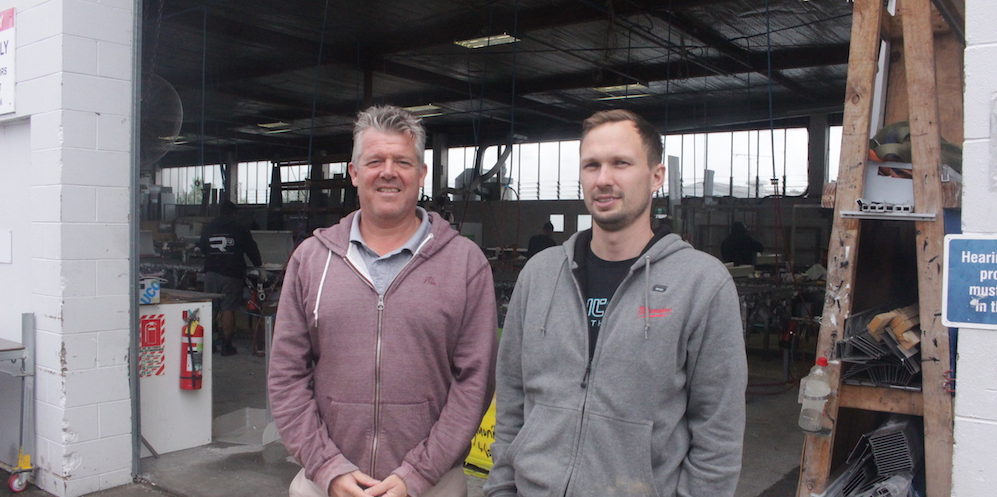Symonite’s been growing and, like any business, it’s been experiencing some growing pains – especially when it comes to communication skills.
Misunderstandings around instructions from project managers, and a lack of confidence to speak up if they weren’t sure about something, were leading to confusion on the factory floor. The result? Increased time and resource wastage.
The team at Heco Group (who own Symonite, KBL Serene Joinery, and ACMF, along with four other companies) knew they needed to do something to achieve their goal of zero errors and minimised waste.
Recognising a communication skills gap
Symonite, and its sibling companies KBL Serene Joinery and ACMF, had already been making significant leaps forward with a new structure for the factory, plenty of quality control measures in place, team meetings weekly, and toolbox meetings once a month.
However, Stuart Scott, General Manager at KBL Serene Joinery, explains “they were effective to some degree, but the root cause was cultural differences and a lack of English. It worked, but we wanted to take it to the next level.”
Many of the team come from the Philippines and the Islands and don’t speak English as a first language – so communication isn’t always easy.
Having seen what Upskills had done at Irvine’s during his time at Goodman Fielder, Stuart was confident that they could make a real difference to communication skills at Symonite. However, he admits that it was a “leap of faith” for directors John and Ben to allow three guys to take 30 hours between them each week out of production.
They knew it had to be done though. “We were constantly having issues of things getting made wrong – really basic things,” shares Stuart. “It was also important for them to have the confidence to put their hand up if something isn’t right. We wanted something that showed them, ‘You’re part of Symonite; help us get better by helping you to grow as individuals.’”
Making manufacturing lean
For Symonite, making manufacturing leaner and reducing the amount of waste produced was vital. With so many construction projects, and demand continuing to rise well beyond current capacity, they needed to create efficiencies.
“Ultimately it was to get them to understand manufacturing, why the production plan is important – with the amount of panels needed in a given day getting out the door in a timely manner,” explains Stuart. “If they don’t, we’ve got installers waiting and getting paid to do nothing. All because one of our guys can’t read the drawing properly.”
With errors not being found out until panels were already on site, the wastage was significant.
“The lean manufacturing side was about getting the guys to understand what waste is and how we can eliminate it in terms of time and materials, while getting more efficient at getting product out the door,” explains Stuart. “We’re trying to drive the error rate down to zero and get the number of panels up.”

Stuart Scott & James Snaddon
Change from within
Recognising that real change comes from a holistic approach, Symonite have implemented several other measures to improve their lean manufacturing approach and cut down on errors. Daily production plans displayed clearly on TV screens, free lunches when weekly targets are conquered, employee of the month awards, an improved layout, and streamlining of processes have all made a big difference as well.
Recognising the value of ideas that come from the floor itself, they’ve also implemented several of the projects that the team worked on throughout the Upskills programme.
“A few of the team created a pre-employment employee handbook. The guys who started before just got training from one guy who’s trained from another, so you get very different training styles,” explains James Snaddon, Factory Manager at Symonite. “We wanted a Symonite standard, so they did a booklet. We started using it with new guys when we employed them; gave them the book to read before they started.”
Stuart adds, “They also did a project on tools, as tools were always getting lost in the factory. When one guy wanted to use a tool, there was never enough. They identified all the tools in the factory – what they use, what they needed – and were able to show the cost saving if no-one was waiting around for tools. We’ve since purchased all those tools on their recommendation.”
Another project involved standardising how bracketing is done within the company. One group made a visual board, so that everybody could see exactly which parts or systems were being referenced at any time.
“That one’s probably been the most useful in the factory as it’s quite visual,” shares James. “We’ve had a lot of new guys come in, and having visual boards means the team can explain the drawings better to the new guys.”
Since their Upskills training, the team has also felt more confidence to speak up with ideas to improve the way the factory runs. “We’ve had heaps more ideas from the guys on the floor of what to do to achieve 200 panels a day,” shares James.
Cutting the error rate in half
Since working with Upskills, Symonite have made significant inroads towards their goal of cutting down errors and waste.
“Before when we were doing 100 panels a day, we had about a 10% error rate,” says James. “Now that we’re doing 200 panels a day, we’re probably still only getting ten panels done incorrectly. The error rate and wastage have definitely gone down. One week we did 900 panels and there were only three or four panels that were wrong, which is pretty good! The team are picking up problems before they go all the way through.”





